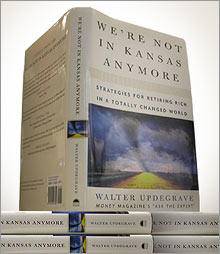|
|

|
|
More information on Updegrave's new book.
|
|
|
|
|
|
|
NEW YORK (CNN/Money) -
My boyfriend and I, both in our mid-twenties, have been discussing our marriage and our future. We're both employed as engineers and we both contribute to our 401(k) and save outside our plan.
Our question: what is the best plan for saving for both a house and a wedding? We figure we'll need 20 percent for a down payment for a house, while the average cost of a wedding runs $20,000. We're feeling a bit overwhelmed. Any advice?
--Monika, Fort Worth, Texas
Sounds to me like you and your future hubby have some big-time saving ahead of you. Let's see, if you figure $20,000 for the wedding and $30,000 for a 20 percent down payment on a $150,000 house, then throw in another $3,000 to $5,000 or so in various closing costs for your mortgage and new home. It looks like you're shooting at accumulating $55,000 or so.
If you want to pull all this off within five years or so -- that is, while you're still in your 20s -- you're going to have to start putting away some serious money each month.
Assuming you earn a return of about 5 percent -- and I don't think you should count on anything higher since you can't take on much risk if you really want that money to be there in five years -- you would have to put away about $800 a month outside your 401(k) accounts to come up with something close to $55,000.
That's just a rough estimate, of course. If you manage to earn more than 5 percent, you can put away a bit less, or reach your goal sooner. And if you earn less than 5 percent, you're going to have to put away more, or reach your goal later. I haven't figured in the effect of taxes, either, which means even the $800 a month guesstimate is probably low.
Now, there's nothing that says you have to do both these things at the same time -- that is, wait until you've got enough for the wedding and the house. You could do one first and then continue saving for the other.
I suppose most people would go for the wedding first and then the house. After all, not to be crass about it, but if you made it known that instead of the usual kitchen appliances, silver flatware and crystal champagne flutes that you would really, really prefer some help in accumulating a down payment for a home, I'd imagine you might get some takers.
Perhaps a smaller wedding?
Or you might want to consider this radical idea: how about instead of spending $20,000 on an affair that essentially lasts one day, you have a very low-key wedding and put the money you saved toward your home down payment?
Obviously, that's a personal call, although I think that a case can be made that an out-of-the ordinary wedding can often be more memorable than a conventional one.
I've always thought a quick informal wedding on the 3-hour Circle Line tour boat that circumnavigates the island of Manhattan would be a terrific way to go. For a $28 fare, you get a cruise on the Hudson, East and Harlem rivers and wonderful views of New York City, not to mention the Statue of Liberty. It's like getting a wedding-honeymoon package deal -- well, almost.
Besides, it's the love and commitment that really counts, not the dress and the catering bill, right?
Invest conservatively
Whatever route you decide to go, I recommend that you invest your savings conservatively, which is to say put the bulk of the money in short- to intermediate-term bond funds or CDs and very little in stock funds. Our Asset Allocator tool can give you an idea of how you might divvy up your savings among different types of investments.
And when you're within a year or so of paying for the wedding or closing on the house, the money you'll need for that goal should be sitting in cash -- that is, a savings account or a money market fund.
One thing you don't want to do if you can help it is cut back on your retirement savings regimen while saving for the wedding and the house. So keep socking that money away in your 401(k)s.
In a real pinch, I suppose you could borrow from your 401(k)s if you come up a bit short on the nuptial nest egg or the house fund. But if you can pull this off without dipping into your retirement till, you'll not only be in much better shape financially, you'll also have learned a valuable lesson about how you can achieve goals by working together -- a lesson that can be applied to many other areas of your lives together.
Walter Updegrave is a senior editor at MONEY Magazine and is the author of "We're Not in Kansas Anymore: Strategies for Retiring Rich in a Totally Changed World."

|